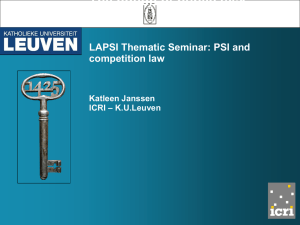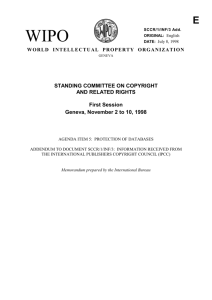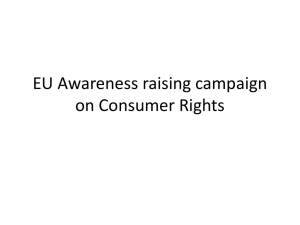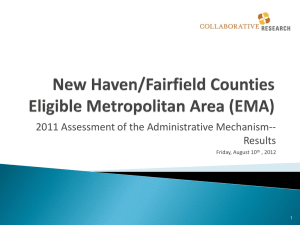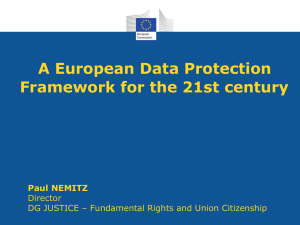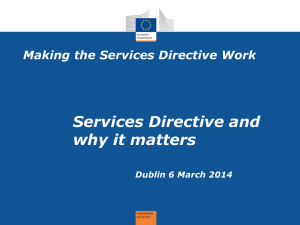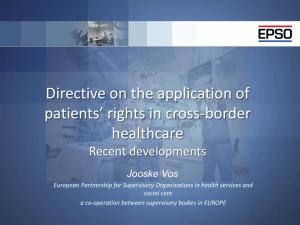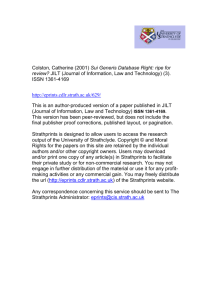Estelle Derclaye, Database Protection and PSI Re
advertisement
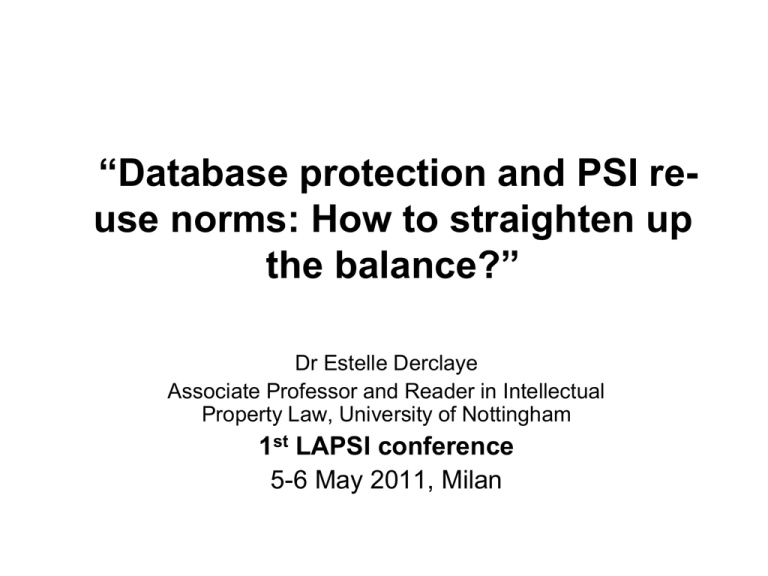
“Database protection and PSI reuse norms: How to straighten up the balance?” Dr Estelle Derclaye Associate Professor and Reader in Intellectual Property Law, University of Nottingham 1st LAPSI conference 5-6 May 2011, Milan The problem • State information (PSI) = rich, accurate, and therefore valuable and reliable => state has a lot of power as can sometimes benefit from copyright and the database sui generis right on its information collections and can charge monopoly prices if sole source data • >< laws forcing the state to give access to its documents and allow re-use either free of charge or at minimal cost • Thesis: the state should not benefit from database sui generis right and copyright for several reasons – does the Directive on PSI re-use provide an answer to this problem and if not, what can be done? (c) E. Derclaye 2011 2 Overview • 1. Features of the database sui generis right and copyright of specific relevance to PSI • 2. Features of the Directive on re-use of PSI of specific relevance to databases • 3. Failure of the two directives and possible solutions (c) E. Derclaye 2011 3 1.1. The database sui generis right • Art. 13: Database Directive is without prejudice to, among others, the legislation on access to public documents – not reuse • Art. 8 of the Directive Proposal = compulsory licence if “the database is made publicly available by a public body which is either established to assemble or disclose information pursuant to legislation, or is under a general duty to do so” and also in cases of monopoly (c) E. Derclaye 2011 4 1.1. The database sui generis right • Broad rights, scarce and narrow exceptions, potentially perpetual term (dynamic databases) • Strong right even more so in cases of monopolies which is often the case with state databases but… • Can the state really benefit from the database sui generis right? (c) E. Derclaye 2011 5 1.1. The database sui generis right • Not totally clear but possible because – Deletion of article 8 of Directive Proposal – No similar provision regarding traditional limitations existing in copyright laws for database right – Database maker? Needs investment => disputable that state takes financial risk as already have public money but what is a maker and what is investment? – Need to prove investment in obtaining, verifying or presenting the data, separate from creating data (BHB, Fixtures Marketing decisions); most state databases will be spin-off but not all (c) E. Derclaye 2011 6 1.2. Copyright • New potential problem: copyright protection for data? (Football Dataco, CJ reference) • Q to CJ: Does copyright only subsist if there is selection or arrangement of pre-existing data? – If yes, Football Dataco does not have copyright because giving a date to a match is creating data, not selecting or arranging it. – If no, copyright subsists and the BHB and Fixtures Marketing rulings are completely bypassed. • => Determination of whether copyright can subsist in fixture lists and similar databases => monopoly on information? (c) E. Derclaye 2011 7 2. The Directive on PSI re-use • No obligation for Member States to allow re-use => only moral duty – Directive’s biggest flaw • Definition of document: virtually any information in any form (text, visual or sound), except computer programs => includes databases • Definition of PSB: the state, including regional and local authorities and bodies governed by public law, bodies financed for the most part by the state – => easy to circumvent if private sector finances 50,1 % – => all three branches? – Opinions in consultation on Directive review: one of the main hurdles (c) E. Derclaye 2011 8 2. The Directive on PSI re-use • Definition of PSI: documents held by public sector bodies (PSB) except documents of – third parties protected by IPR – public service broadcasters, libraries, archives, educational and research and cultural establishments, such as universities, museums, orchestras, theatres… – excluded by national access regimes including on the grounds of the protection of national security, defence, or public security, statistical or commercial confidentiality – => Some people want the definition of PSB extended (opinions in consultation on Directive review) (c) E. Derclaye 2011 9 2. The Directive on PSI re-use • Interface between PSI and IPR (rec. 22): “The Directive does not affect the existence or ownership of intellectual property rights of public sector bodies, nor does it limit the exercise of these rights in any way beyond the boundaries set by this Directive. The obligations imposed by this Directive should apply only insofar as they are compatible with the provisions of international agreements on the protection of intellectual property rights [in particular the Berne Convention and TRIPS]. Public sector bodies should, however, exercise their copyright in a way that facilitates re-use.” • Directive does not tackle issue whether the state should have IPR in the first place … Origin: left open by Berne (c) E. Derclaye 2011 10 2. The Directive on PSI re-use • Art. 2(4) Berne Convention: “It shall be a matter for legislation in the countries of the Union to determine the protection to be granted to official texts of a legislative, administrative and legal nature, and to official translations of such texts.” • Not every Member State has a provision excluding copyright for such official texts and even less for database sui generis right • Anyway, not every creation made by the state is an official text (c) E. Derclaye 2011 11 Conclusion: Failure of the Directives • PSI Directive gives so many options that Member States laws diverge esp. on issue of protection (so before we speak of reuse, licensing, charging etc.) • E.g. UK and Belgium, most provisions follow the Directive but there are some which detail it and others which depart from it • Database Directive is also not entirely clear on PSBs’ sui generis right and copyright (c) E. Derclaye 2011 12 3.1. Solutions de lege ferenda • Best solution: clear definition of state body, exclude state databases from copyright and sui generis right protection altogether (with very few exceptions e.g. confidentiality, privacy etc) – revise either Directive or both • This would solve the licensing problem • But contrary to Berne? Texts only not artistic or audiovisual works • Alternatively: extend all copyright exceptions and limitations to the sui generis right and make them imperative and standardise licences e.g. only CC0 or CCBy (c) E. Derclaye 2011 13 3.2. Solutions de lege lata - based on the Database Directive • A strict interpretation of the Directive in the footsteps of the ECJ 2004 decisions will already restrict the number of cases where the state owns sui generis rights; e.g. not allow the circumvention of the Directive by the state through the outsourcing of its database activities to private companies • Courts could apply the exception or exclusion of official documents to the sui generis right by analogy with their respective copyright laws (analogical and teleological interpretation of the Directive) (c) E. Derclaye 2011 14 3.2. Solutions de lege lata - based on the Database Directive • Some national courts have denied sui generis right protection to PSBs’ databases because • No risk was taken (Dutch Administrative Supreme Court, 29/4/2009) • Art. 11 DBD benefits only private individuals and businesses (CFI Rome, 5/6/2008, Edizioni Cierre v. Poste Italiane) but argument is weak (c) E. Derclaye 2011 15 3.2. Solutions de lege lata - based on national laws • Art. 8 Dutch Database Act: “1. The public authority shall not have the right referred to in Article 2, paragraph 1, with respect to databases of which it is the producer and for which the contents are formed by laws, orders and resolutions promulgated by it, legal decisions and administrative decisions. 2. The right, referred to in Article 2, paragraph 1, shall not apply to databases of which the public authority is the producer, unless the right is expressly reserved either in general by law, order or resolution or in a particular case as evidenced by a notification in the database itself or when the database is made available to the public.” • // copyright act exception for official acts but para 2 “reserved”… (c) E. Derclaye 2011 16 Conclusion • Does the Directive on PSI re-use affect the state’s sui generis right? No. • Consolation: national access regimes and implementation laws seem quite generous esp. in relation to IPR-protected subject-matter although not yet completely satisfactory • Either, ideally both, Directives need revising on the intellectual property protection and definition of ‘state’ (should the state’s role be to make and sell added value data or just provide raw data free of charge?) points, and of course on other points as well (charging,…) (c) E. Derclaye 2011 17 Thank you for your attention University of Nottingham School of Law http://www.nottingham.ac.uk/law/index.aspx ederclaye@hotmail.com Estelle.derclaye@nottingham.ac.uk
